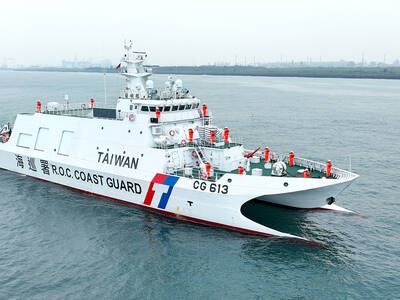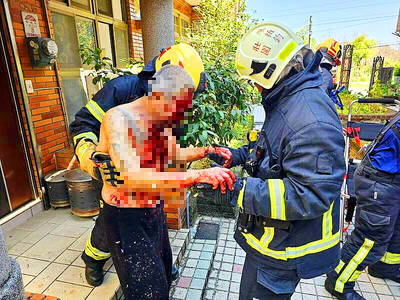Taiwanese astronomer Yung Yuk-ling (翁玉林) and physicist Chen Sow-hsin (陳守信) have won top honors for outstanding contributions to the fields of planetary science and nuclear science, Academia Sinica said on Tuesday.
Yung has won the Gerard P. Kuiper Prize, one of the top prizes in the field of planetary science, the American Astronomical Society’s (AAS) Division for Planetary Sciences announced last month.
He, along with recipients of four other planetary science prizes, are to be honored at an awards ceremony in Maryland in November.
Yung, the first Taiwanese to win the award, is “a founding father of planetary atmospheric chemistry and one of the most influential researchers in the field,” the AAS said in a statement.
“His unique integration of observations, laboratory data, and careful modeling has yielded pioneering insights into the current properties and behavior of solar-system atmospheres, as well as their historical evolution,” it said.
“His models of the chemistry of planetary atmospheres have been widely used to interpret the results from spacecraft missions, including the Vikings, Voyagers, Pioneer Venus, Galileo, Venus Express, Mars Science Laboratory, Cassini and New Horizons,” it said.
Named after one of the founding fathers of contemporary planetary sciences, Gerard Kuiper, the prize seeks to honor scientists whose achievements have most advanced the understanding of the solar system and its members.
Yung, who is a Smits Family professor at the California Institute of Technology, is renowned for his contributions in the areas of atmospheric photochemistry and aeronomy, global climate change, radiative transfer, atmospheric evolution, and mesospheric-thermospheric chemistry and exchange, Academia Sinica said.
Yang was also a recipient of the NASA Exceptional Scientific Achievement Medal in 2004, it said.
Chen is the winner of this year’s Guinier Prize for his achievement in the field of small-angle scattering, the International Union of Crystallography announced last month.
Chen, an emeritus professor at Massachusetts Institute of Technology’s Department of Nuclear Science and Engineering, is to receive his prize and present a plenary lecture on Sept. 17 at the 16th International Conference on Small-Angle Scattering in Berlin.
Small-angle scattering is a technique used in the field of non-
crystalline materials, such as colloids and macromolecules, to investigate the nanostructures and inter-particle correlation in liquids and solids, including their size, shape and internal structure.
The Guinier Prize was established in honor of the father of small-angle scattering, French physicist Andre Guinier, and the prize is given for lifetime achievement, a major breakthrough or an outstanding contribution to the field.
Chen has won recognition for his development of new methods for data analysis, together with pioneering experiments on the structure and mutual interactions of self-assembled systems such as micelles, microemulsions and protein-surfactant complexes in solution.
Chen also won the Clifford G. Shull Prize presented by the Neutron Scattering Society of America in 2008, Academia Sinica said.

A total lunar eclipse coinciding with the Lantern Festival on March 3 would be Taiwan’s most notable celestial event this year, the Taipei Astronomical Museum said, urging skywatchers not to miss it. There would be four eclipses worldwide this year — two solar eclipses and two lunar eclipses — the museum’s Web site says. Taiwan would be able to observe one of the lunar eclipses in its entirety on March 3. The eclipse would be visible as the moon rises at 5:50pm, already partly shaded by the Earth’s shadow, the museum said. It would peak at about 7:30pm, when the moon would

The Coast Guard Administration (CGA) yesterday held a ceremony marking the delivery of its 11th Anping-class offshore patrol vessel Lanyu (蘭嶼艦), saying it would boost Taiwan’s ability to respond to Beijing’s “gray zone” tactics. Ocean Affairs Council Deputy Minister Chang Chung-Lung (張忠龍) presided over the CGA event in the Port of Kaoshiung. Representatives of the National Security Council also attended the event. Designed for long-range and protracted patrol operations at sea, the Lanyu is a 65.4m-long and 14.8m-wide ship with a top speed of 44 knots (81.5kph) and a cruising range of 2,000 nautical miles (3704km). The vessel is equipped with a

DEFENSE: The US should cancel the US visas or green cards of relatives of KMT and TPP lawmakers who have been blocking the budget, Grant Newsham said A retired US Marine Corps officer has suggested canceling the US green cards and visas of relatives of opposition Taiwanese lawmakers who have been stalling the review of a proposed NT$1.25 trillion (US$39.7 billion) special defense budget. The Executive Yuan has proposed the budget for major weapons purchases over eight years, from this year to 2033. However, opposition lawmakers have refused to review the proposal, demanding that President William Lai (賴清德) first appear before the Legislative Yuan to answer questions about the proposed budget. On Thursday last week, 37 bipartisan US lawmakers sent a letter to Legislative Speaker Han Kuo-yu (韓國瑜), the heads

Two siblings in their 70s were injured yesterday when they opened a parcel and it exploded, police in Yilan said, adding the brother and sister were both in stable condition. The two siblings, surnamed Hung (洪), had received the parcel two days earlier but did not open it until yesterday, the first day of the Lunar New Year holiday in Taiwan, police said. Chen Chin-cheng (陳金城), head of the Yilan County Government Police Bureau, said the package bore no postmark or names and was labeled only with the siblings’ address. Citing the findings of a